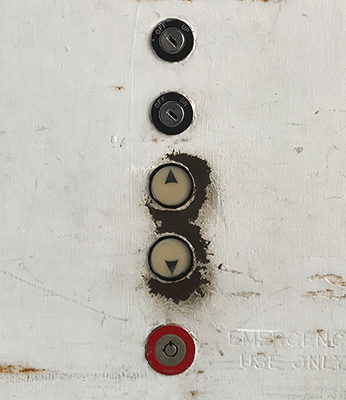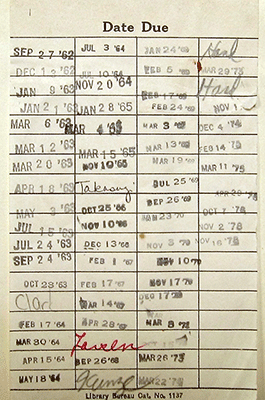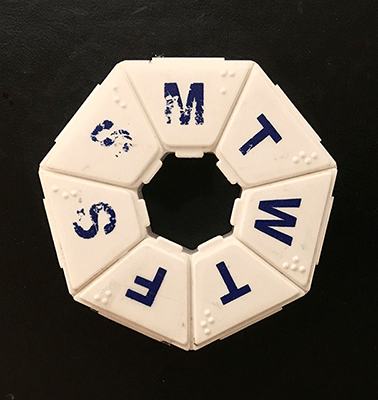edition of 8, signed, $1,500 unframed
For me, the most conceptually beautiful photograph in Ed Ruscha’s Thirtyfour Parking Lots is the one of the Goodyear Tire Store at 6610 Laurel Canyon. It’s a long narrow lot, and the parking spaces closest to the store are heavily stained with oil. The staining gradually decreases the further the spaces are from the store until, at the furthest spaces, there is no staining at all. The image perfectly depicts evidence and patterns of use. The idea is somewhat similar to Richard Long’s A Line Made by Walking in which the artist walked back and forth on grass until he created a visible line, however, the evidence of repeated actions in the Ruscha image were “found.”
The Greg Colson photographs in this small, three-piece, online exhibition reflect a related interest in the found residue of daily activities. His photograph of elevator buttons at LACMA illustrates the repeated actions of touching - in fact, the direction of the touch appears to be coming from the right side. The image also inherently contains that split-second moment of decision when one is visually asked the question, “where are you going?” In his photograph of due dates stamped into a library book, the date is not only a reassuring reminder to the book’s current possessor, but also a curious record of those that came before: how often was the book borrowed, what was the greatest lapse in time between checkouts? (Coincidentally, this record oddly parallels a piece by Ruscha called Information Man, in which he speculates on the possible whereabouts and conditions of all his books.) Finally, Colson’s photograph of a pill caddy represents an object that is distinctly designed to create a pattern in one’s life. It is a calendar with an action and purpose built into it, perhaps with significant consequences if the action is not performed properly.
The cycles of life, our daily rituals, and our repetitive actions can have a comforting quality when we are immersed in them, but also when we take the time to see them from an objective remove. Legend has it, during the French Revolution, when the calendar was changed to a ten-day week, the cows would not cooperate with the farmers on the seventh day. Our calendars have been equally disrupted. In addition to catastrophic human loss, the current pandemic has toppled our sense of structure, unsettling us, and causing disorientation. These photographs are emblematic of that societal rhythm we currently seek.
- Craig Krull
All of the artwork in this online exhibition is available for purchase.
For inquiries, please call 310-913-0749 or email at info@craigkrullgallery.com.
The Greg Colson photographs in this small, three-piece, online exhibition reflect a related interest in the found residue of daily activities. His photograph of elevator buttons at LACMA illustrates the repeated actions of touching - in fact, the direction of the touch appears to be coming from the right side. The image also inherently contains that split-second moment of decision when one is visually asked the question, “where are you going?” In his photograph of due dates stamped into a library book, the date is not only a reassuring reminder to the book’s current possessor, but also a curious record of those that came before: how often was the book borrowed, what was the greatest lapse in time between checkouts? (Coincidentally, this record oddly parallels a piece by Ruscha called Information Man, in which he speculates on the possible whereabouts and conditions of all his books.) Finally, Colson’s photograph of a pill caddy represents an object that is distinctly designed to create a pattern in one’s life. It is a calendar with an action and purpose built into it, perhaps with significant consequences if the action is not performed properly.
The cycles of life, our daily rituals, and our repetitive actions can have a comforting quality when we are immersed in them, but also when we take the time to see them from an objective remove. Legend has it, during the French Revolution, when the calendar was changed to a ten-day week, the cows would not cooperate with the farmers on the seventh day. Our calendars have been equally disrupted. In addition to catastrophic human loss, the current pandemic has toppled our sense of structure, unsettling us, and causing disorientation. These photographs are emblematic of that societal rhythm we currently seek.
For inquiries, please call 310-913-0749 or email at info@craigkrullgallery.com.
edition of 8, signed, $1,500 unframed
edition of 8, signed, $1,500 unframed


